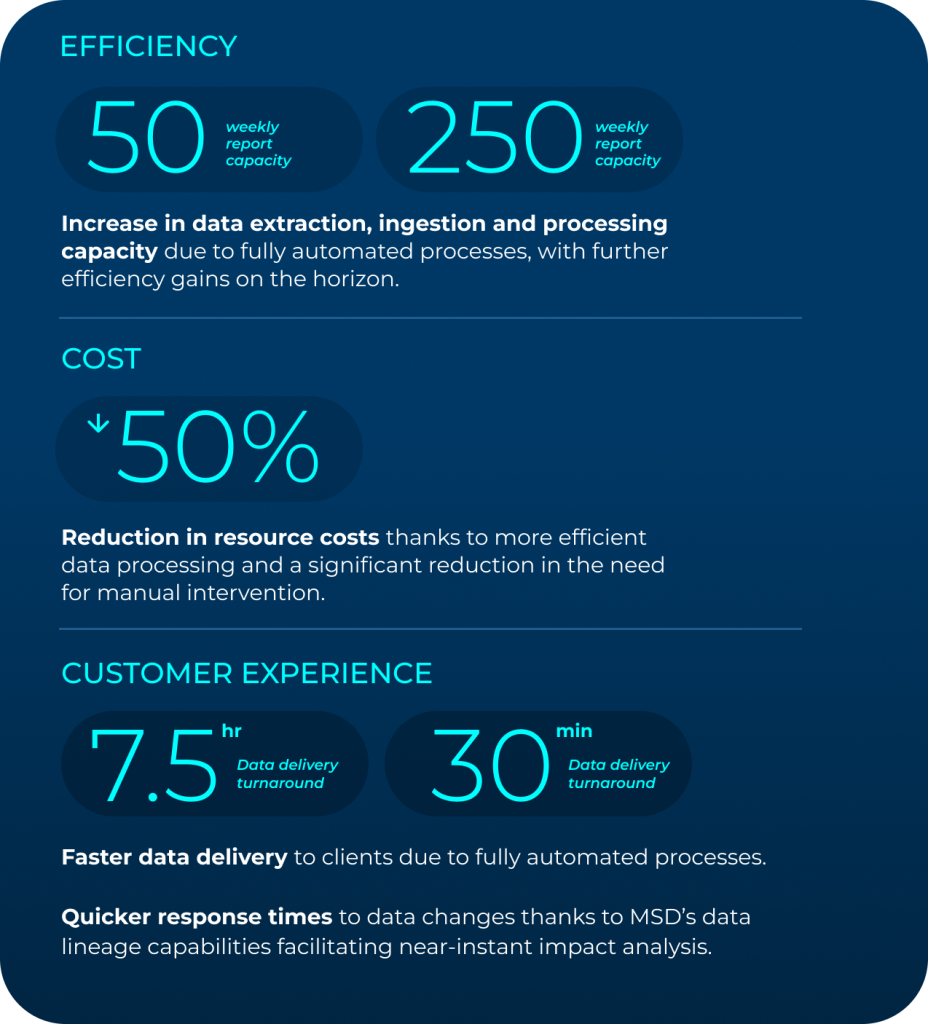
Discover how Raw Knowledge drove a 400% increase in their weekly reporting capacity using their innovative Managed Smart Data Platform to support the automated delivery of excess reportable income (ERI) data.
Raw Knowledge’s challenge with ERI data
At Raw Knowledge, we have been sourcing, processing, and delivering high-quality excess reportable income (ERI) data since the very start of the offshore reporting funds regime.
We provide our clients with a full dataset for tax reporting, including fields rarely provided on a fund manager’s original documentation. The extraction, ingestion and processing of this data had been a completely manual process for our team, requiring large amounts of time-consuming validation.
We required the equivalent of three members of staff, working at full capacity, to complete the processes with the highest degree of accuracy possible. Further, due to the complex and bespoke nature of the data requested by our clients, these processes were becoming increasingly dependent on team members with the highest level of data handling expertise.
It was important to us that we avoided any dependencies on specific people, but we knew that to have a truly sustainable solution for our data delivery, we could not pour more money into recruitment or more intense training for our existing staff. Instead, we knew that we needed a solution that would eliminate these bottlenecks and streamline the way we extracted, processed, and verified our data. We also wanted to ensure that our processes would be scalable and sustainable to accommodate our rapidly growing customer base.

Building an innovative new solution
We are lucky at Raw Knowledge to form part of the wider Industrial Thought Ltd Group. As part of this, we have access to our parent company’s product development and technology innovation hub, Thought Train. When we began looking for a new, comprehensive data management solution to support our ERI data delivery, we decided to get in touch with Thought Train as they had been quietly developing an AI-powered data management platform.
It felt like a natural fit to combine forces with Thought Train to see how we could work together to develop this platform further to address our challenges around ERI data. The key development needed was to extend the front-end of the platform, expanding its ability to scrape and then validate the ingested data, as well as develop the delivery side of the platform so we could accelerate turnaround times for our clients.
We began testing the platform almost immediately and we worked closely with Thought Train to advance the work they had already done around the extraction, ingestion and processing stage of data management, as well as incorporate additional capabilities such as data lineage. This work eventually led to the creation of what is now our Managed Smart Data Platform.
Instant results with the Managed Smart Data Platform
The use of the Managed Smart Data Platform in the delivery process of Raw Knowledge’s ERI data officially began at the end of 2024. In just six short months of use, it has delivered profound operational improvements, cost-savings across the business, and helped scale our data capabilities significantly.
In the early stages of use, we saw our data delivery turnaround times drop from 7.5 hours on average to just 30 minutes. These efficiency gains were primarily down to the Managed Smart Platform’s automated data processes facilitating an immediate reduction in the need for our team to manually intervene to reconcile or correct data.
With our team freed from manual data handling, they could be redeployed to higher-value tasks such as client relationship management and customer service delivery. This, in turn, helped strengthen our client experiences and meant our team were empowered to be more proactive in their work with our clients.
For example, in the past, our team had to primarily focus on responding to the needs of clients as they arose. Now, thanks to the efficiency gains made by the incorporation of the Managed Smart Data Platform into our ERI data delivery, our team could take the time to fully consider how a client’s data needs may evolve over time and adapt our service accordingly to ensure they remain continually supported.
Another key benefit facilitated by the Managed Smart Data Platform was the stark increase in our data extraction, ingestion and processing capacity, with our weekly report capacity jumping from around 50 to 250. This meant our data operations were now truly scalable and could efficiently meet the demands of new clients or requests.

Bitesize Case Study: Fast-Tracking Data Correction with the Managed Smart Data Platform
The challenge: A fund manager had republished several years’ worth of ERI data, correcting errors that had previously appeared in their reporting. Raw Knowledge’s datasets needed to be updated and impacted clients needed to be informed.
Before the Managed Smart Data Platform: Correcting our datasets would have taken around four weeks. The Raw Knowledge team would have had to drop everything to cross-reference the data, update our datasets, and send the updated information to the impacted clients. This would’ve been an entirely manual process.
With the Managed Smart Data Platform: Correcting our datasets, triple-checking its accuracy and sending the updated information to the impacted clients would now take less than a day thanks to the automated processes facilitated by our platform.
Facilitating long-term transformation
The Managed Smart Data Platform monitors corrections, adjustments and activities made to datasets by our team, supporting continuous business process improvement. This technology feedback loop when combined with the platform’s low-code platform architecture has meant that improvements to data processing can quickly be assessed and deployed. As a result, we foresee our data extraction, ingestion and processing times reducing further as the platform becomes more embedded in our business.
Beyond these immediate efficiency gains and the impact this has had on our ERI data delivery, the platform was also been essential in catalysing our evolution as a business.
Since our beginnings as part of our sister company, Financial Software Ltd, Raw Knowledge has been a business focused on providing specialist financial data to support UK tax reporting. The incorporation of the Managed Smart Data platform into our day-to-day operations has changed that, empowering us as a business to look at diversifying across the data market and see how our data management expertise could extend beyond the financial services industry entirely.
What’s next for the Managed Smart Data Platform?
We’ve seen the value the Managed Smart Data Platform is driving in our business. Now we want to work with a forward-thinking business to see what this pioneering platform can do for others. We want to work with you to understand your pain points around data management and adapt our platform to meet your unique needs.
Together we would draw up a blueprint for what your Managed Smart Data Platform could look like: which of our core capabilities would best serve your current and future data management needs, how you’d like your final data to be presented and every step in between.
The global data landscape is growing in complexity and volume every day. Failure to keep pace with this evolution could hold your business back. Ensure your firm maintains a competitive advantage by collaborating with us as we advance our future-proof, trusted source platform.
Join us as we lead the innovation on which the financial services industry of the future is built.



